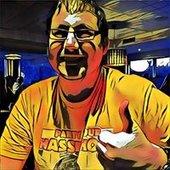I wrote a code for a particle generator. It runs, but it doesn't show anything. Here is the code:
Emitter.cpp:
#include "Emitter.h"
Emitter::Emitter(GLuint nrParticles, glm::vec3 position, GLfloat radius, char *imgName)
{
this->m_Position = position;
this->m_radius = radius;
for (int i = 0; i < nrParticles; i++)
{
this->particles.push_back(Particle(glm::vec3(0.0f, 0.0f, 0.0f), glm::vec3(0.0f, 0.0f, 0.0f), 0.0f, "blur.png"));
}
}
void Emitter::Draw(Shader &shader)
{
for (int i = 0; i < particles.size() - 1; i++)
{
particles[i].Draw(shader);
}
}
void Emitter::Update(GLfloat dt)
{
for (int i = 0; i <= particles.size() - 1; i++)
{
particles[i].Update(dt);
}
}
void Emitter::SetParticlesAttributes()
{
for (int i = 0; i <= particles.size() - 1; i++)
{
particles[i].setLife(10.0f); //(((rand() % 10) + 1) * 15);
particles[i].setVelocity(glm::vec3(0.0f, 2.0f, 0.0f)); //(((rand() % 10) + 1) * 2));
}
}
Particle.cpp:
#include "Particle.h"
#include "Camera.h"
GLfloat vertices[] = {
0.5f, 0.5f, 0.0f, 1.0f, 1.0f,
0.5f, -0.5f, 0.0f, 1.0f, 0.0f,
-0.5f, -0.5f, 0.0f, 0.0f, 0.0f,
-0.5f, 0.5f, 0.0f, 0.0f, 1.0f
};
//Camera camera(glm::vec3(0.0f, 0.0f, 10.0f));
Vbo vbo;
Ebo ebo;
Texture texture;
GLuint indices[] = { // Note that we start from 0!
0, 1, 3, // First Triangle
1, 2, 3 // Second Triangle
};
Particle::Particle(glm::vec3 position, glm::vec3 velocity, GLfloat life, GLchar *imgName)
{
this->m_Position = position;
this->m_Velocity = velocity;
this->m_Life = life;
this->vao.Init(1);
vbo.Init(1);
ebo.Init(1);
this->vao.Bind();
vbo.Bind(vertices, 20);
ebo.Bind(indices, 6);
this->vao.AttribPointer(0, 3, 5, 0);
this->vao.AttribPointer(1, 2, 5, 3);
this->vao.UnBind();
texture.Init(1, imgName);
}
void Particle::Draw(Shader &shader)
{
shader.Use();
glm::mat4 model;
glm::mat4 view;
glm::mat4 projection;
model = glm::translate(model, glm::vec3(this->m_Position));
model = glm::scale(model, glm::vec3(30.0f, 30.0f, 0.0f));
view = glm::lookAt(glm::vec3(0.0f, 0.0f, 3.0f), glm::vec3(0.0f, 0.0f, 0.0f), glm::vec3(0.0f, 1.0f, 0.0f));
projection = glm::perspective(45.0f, (float)1600 / (float)1200, 0.1f, 100.0f);
GLuint modelLoc(glGetUniformLocation(shader.Program, "model"));
GLuint viewLoc(glGetUniformLocation(shader.Program, "view"));
GLuint projLoc(glGetUniformLocation(shader.Program, "projection"));
glUniformMatrix4fv(modelLoc, 1, GL_FALSE, glm::value_ptr(model));
glUniformMatrix4fv(viewLoc, 1, GL_FALSE, glm::value_ptr(view));
glUniformMatrix4fv(projLoc, 1, GL_FALSE, glm::value_ptr(projection));
texture.Bind();
glUniform1i(glGetUniformLocation(shader.Program, "ourTexture"), 0);
this->vao.Bind();
glDrawElements(GL_TRIANGLES, 6, GL_UNSIGNED_INT, 0);
this->vao.UnBind();
}
void Particle::Update(GLfloat dt)
{
if (this->m_Life > 0)
{
this->m_Position += m_Velocity;
}
else
{
//m_Life -= dt;
}
}
void Particle::setLife(GLfloat life)
{
this->m_Life = life;
}
GLfloat Particle::getLife()
{
return this->m_Life;
}
void Particle::setPosition(glm::vec3 position)
{
this->m_Position = position;
}
glm::vec3 Particle::getPosition()
{
return this->m_Position;
}
void Particle::setVelocity(glm::vec3 velocity)
{
this->m_Velocity = velocity;
}
glm::vec3 Particle::getVelocity()
{
return this->m_Velocity;
}
Main.cpp:
#include <iostream>
#include <glad/glad.h>
#include<KHR\khrplatform.h>
//GLFW
#include <glfw3.h>
#include "Shader.h"
#include "Camera.h"
// GLM
#include <glm/glm.hpp>
#include <glm/gtc/matrix_transform.hpp>
#include <glm/gtc/type_ptr.hpp>
#include "stb_image.h"
#include "Emitter.h"
void framebuffer_size_callback(GLFWwindow* window, int width, int height);
void processInput(GLFWwindow *window);
// settings
const unsigned int SCR_WIDTH = 1600;
const unsigned int SCR_HEIGHT = 1200;
Emitter *e1;
int main()
{
// glfw: initialize and configure
// ------------------------------
glfwInit();
glfwWindowHint(GLFW_CONTEXT_VERSION_MAJOR, 3);
glfwWindowHint(GLFW_CONTEXT_VERSION_MINOR, 3);
glfwWindowHint(GLFW_OPENGL_PROFILE, GLFW_OPENGL_CORE_PROFILE);
//glfwWindowHint(GLFW_OPENGL_FORWARD_COMPAT, GL_TRUE); // uncomment this statement to fix compilation on OS X
// glfw window creation
// --------------------
GLFWwindow* window = glfwCreateWindow(SCR_WIDTH, SCR_HEIGHT, "LearnOpenGL", NULL, NULL);
if (window == NULL)
{
std::cout << "Failed to create GLFW window" << std::endl;
glfwTerminate();
return -1;
}
glfwMakeContextCurrent(window);
glfwSetFramebufferSizeCallback(window, framebuffer_size_callback);
// glad: load all OpenGL function pointers
// ---------------------------------------
if (!gladLoadGLLoader((GLADloadproc)glfwGetProcAddress))
{
std::cout << "Failed to initialize GLAD" << std::endl;
return -1;
}
// build and compile our shader zprogram
// ------------------------------------
Shader shader("particle.vs", "particle.frag");
e1 = new Emitter(100, glm::vec3(0.0f), 30.0f, "blur.png");
// render loop
// -----------
while (!glfwWindowShouldClose(window))
{
GLfloat dt = glfwGetTime();
// input
// -----
processInput(window);
e1->Update(dt);
// render
// ------
glClearColor(0.0f, 0.0f, 0.0f, 1.0f);
glClear(GL_COLOR_BUFFER_BIT);
e1->Draw(shader);
// glfw: swap buffers and poll IO events (keys pressed/released, mouse moved etc.)
// -------------------------------------------------------------------------------
glfwSwapBuffers(window);
glfwPollEvents();
}
// optional: de-allocate all resources once they've outlived their purpose:
// ------------------------------------------------------------------------
// glfw: terminate, clearing all previously allocated GLFW resources.
// ------------------------------------------------------------------
glfwTerminate();
return 0;
}
// process all input: query GLFW whether relevant keys are pressed/released this frame and react accordingly
// ---------------------------------------------------------------------------------------------------------
void processInput(GLFWwindow *window)
{
if (glfwGetKey(window, GLFW_KEY_ESCAPE) == GLFW_PRESS)
glfwSetWindowShouldClose(window, true);
if (glfwGetKey(window, GLFW_KEY_SPACE) == GLFW_PRESS)
{
std::cout << "Space Pressed" << std::endl;
e1->SetParticlesAttributes();
}
}
// glfw: whenever the window size changed (by OS or user resize) this callback function executes
// ---------------------------------------------------------------------------------------------
void framebuffer_size_callback(GLFWwindow* window, int width, int height)
{
// make sure the viewport matches the new window dimensions; note that width and
// height will be significantly larger than specified on retina displays.
glViewport(0, 0, width, height);
}
I tried to debugged it, but I didn't succeed to figure out the problem. :(
Little help please ? :D








